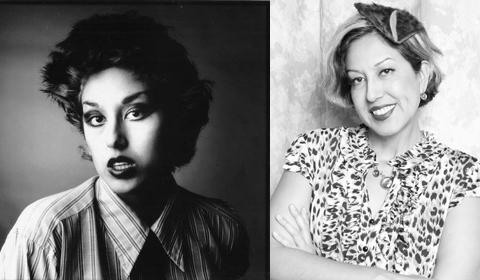
THEN AND NOW Alice Bag. |
Alice Bag (nee Armendariz), who shone bright in the Los Angeles punk scene of the late-1970s, will be in town Saturday to read from her book Violence Girl: East L.A. Rage to Hollywood Stage and to play a few tunes at 7 pm at Rochambeau Library, 708 Hope Street, Providence. Admission is free.
Alice, whose band was featured in the seminal punk rock documentary The Decline of Western Civilization, became a mom, a teacher, and a folk musician as she grew older. But she's never lost the burn. Her latest project: punk outfit Stay at Home Bomb. The Phoenix caught up with her for a Q&A via email prior to her Providence appearance.
YOU GREW UP IN EAST L.A., THE DAUGHTER OF MEXICAN-BORN AND AMERICAN-NATURALIZED PARENTS. YOUR DAD WAS, ALTERNATELY, LOVING AND VIOLENT. PAINT A PICTURE OF YOUR CHILDHOOD – THE GOOD AND THE BAD. My dad could be a terrifying figure. I describe him as a monster who could turn our lives into a nightmare one minute and be gentle and caring the next. He was physically abusive to my mother but always kind to me. So my childhood was alternately sweet and frightening. In many ways, East L. A. is like that: the streets can be tough but they're also brilliant, colorful and full of warmth.
THE BAGS WAS THE FIRST FEMALE-FRONTED BAND TO PLAY THE LEGENDARY PUNK CLUB THE MASQUE. DESCRIBE THAT SHOW AND WHAT IT MEANT TO BE A WOMAN IN THAT SCENE. I was extremely nervous and excited for that first show. We wore bags on our heads, which is where our name came from. I remember Darby Crash, then known as Bobby Pyn, trying to rip the bag off my head. He kept pawing at me during the performance, which added to the chaotic feeling onstage. Eventually he ripped a portion of the bag off and I continued to sing while peeking out at the audience through the rip, it was surreal! I don't remember much about the music itself aside from the fact that it compelled me to move and screech. Suddenly all the impotent silence I'd felt as a helpless little kid watching my mother get beaten and being unable to do a thing about it turned into fury. I felt compelled by an irrepressible force to be heard. I shouted lyrics in rhythmic blasts. The experience was cathartic and after the show I remembered very little about what had happened, I only knew it had been exhilarating and empowering.
PUT THE WEST COAST PUNK SCENE INTO SOME PERSPECTIVE. WHAT DID IT MEAN FOR AMERICAN MUSIC? That's not really my role, I'm not a music writer or a rock historian. My book is about my personal experiences. Violence Girl is valuable to historians not just because it is a first-hand account of the very early L. A. punk scene but because women of color are often underrepresented in historical accounts of any kind.
THIRTY-FIVE YEARS LATER, WHAT DOES LIFE LOOK LIKE FOR A PUNK ROCKER-TURNED-TEACHER-TURNED-MOM-TURNED FOLK MUSICIAN-TURNED PUNK ROCKER AGAIN? In 1977, I was in a punk band playing at the Masque. I'm 53 years old now. When I turned 50, I decided that the second half of my life was an excellent time for a new beginning. I started writing a book, something I had never even dreamed of. It's like discovering the fountain of youth: challenging myself to try something completely new, to step out of my comfort zone. Life became a fresh and thrilling journey again.